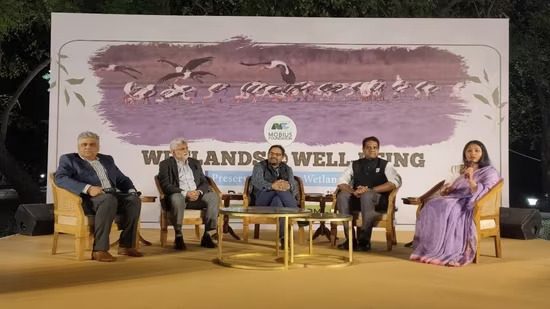The Mobius Foundation held a panel discussion on February 23rd, Friday, at Travancore House, New Delhi to commemorate World Water Day
Mr. Pradip Burman, Chairman of the Mobius Foundation, delivered the introductory remarks to the distinguished guests and said “The value of wetlands lies not just in their beauty but in their ability to sustain life and promote well-being and the beauty of nature is a gift that should never be taken for granted. Let’s cherish it and ensure its survival”
The World Wetlands Day 2024 theme was introduced by Dr. Suneesh Buxy IFS, Member Secretary, Wetland Authority of Delhi. He discussed the conservation of water and wetlands, the relationship between wetlands and communities, and urban wetlands. He also shed light on wetlands by portraying them as our kidneys, forests as our lungs, and rivers as our blood. He emphasised that we are not doing justice to our kidneys, lungs, and blood. He also discussed that our small water bodies are still more significant while we have completed 80 sites under the Ramsar Convention. As the Delhi Wetland Authority, they have designated 1045 water bodies and are actively working to protect these sites.
Mr. Ramveer Tanwar one of the most well-known of the numerous people fighting for water conservation; in fact, he is frequently referred to as “India’s Pond Man” commenced his keynote address by emphasising the wetlands’ immense ecological significance. He has been trying to revitalize and restore these key water reservoirs around the nation for the past few years. He emphasised on his organization’s contribution to energizing wetlands conservation through the promotion of a society-wide strategy. He said “The rate at which water bodies across India are depleting is alarming, as several forms of life depend on lakes and wetlands. The water bodies help recharge the water table, support livelihood and fulfil living beings’ requirements. In the coming times, it’s only expected to get worse.”
A panel discussion on ‘Wetlands for Wellbeing’ was organised in the second session. The session was moderated by Ms. Neha Sinha, Head of Policy and Communications, WWF India, Conservation Biologist and Author. Mr. Soumitra Dasgupta, IFS (Retd.), Ex Principal Chief
Conservator of Forests and Head of Forest Force, West Bengal, Dr. Ritesh Kumar, Director, Wetlands International South Asia, Dr. Aditya Joshi, ex PCCF, HOFF, CWLW – Manipur, Advisor- Think Tank, Mobius Foundation and Mr. Suresh Babu SV, Senior Director – Ecological Footprints, WWF India, participated in the panel discussion.
Mr. Suresh Babu, discussed the crucial role of wetlands and said, “Wetlands can play an important role in recharging the aquifers, which can fuel the rivers. Groundwater is a source of many of our rivers. If we lose our wetlands, groundwater recharge will reduce, and therefore, we can lose the flow in our rivers.”
He explained another issue, “Wetlands served as our buffer against flooding, but because we have damaged and encroached on most of our urban wetlands, we now experience flooding and water logging when the monsoon arrives.”
Dr. Aditya Joshi provided insights into Loktak Lake in Manipur, the largest natural freshwater lake in the north-eastern region of India. During his discussion, he delved into the significant challenges confronting this Ramsar site. Additionally, he underscored the distinctive ecosystem of Loktak and emphasized the reliance of indigenous communities on its diverse ecological services.
Reconnecting wetlands with urban design and water security solutions is what Dr. Ritesh Kumar called for. He also drew attention to the fact that rivers and wetlands were being used as wastelands due to an increase in sewage generation and a lack of investment in efficient sewage treatment technologies. The session included vibrant engagement with the attendees who called for localization of international guidelines and increased local action for wetlands conservation. Mr. Soumitra Dasgupta discussed the conservation strategies implemented for the Sundarban Wetland, situated in the world’s largest mangrove forest. He provided details on the effective approaches employed to actively involve local communities in conservation initiatives while simultaneously safeguarding the region’s tiger population.
In Mr. Praveen Garg’s closing remarks he said going beyond their ecological significance, wetlands function as natural capital, making substantial contributions to local and national economies through a myriad of ecosystem services. By recognizing true value of these unique ecosystems, we can pave the way for a future where sustainable development flourishes in harmony with nature’s silent riches.
The event acted as a forum for collaboration and the exploration of potential collaborations among conservation organisations, financial institutions, and governmental entities.
For More Details Contact
Niddhi Singh
DY Manager (Media and Corporate Communication)
Mobius Foundation
9818-7354-10

